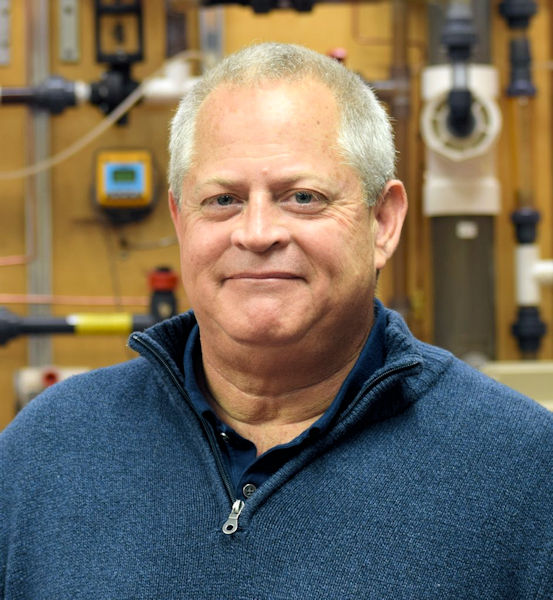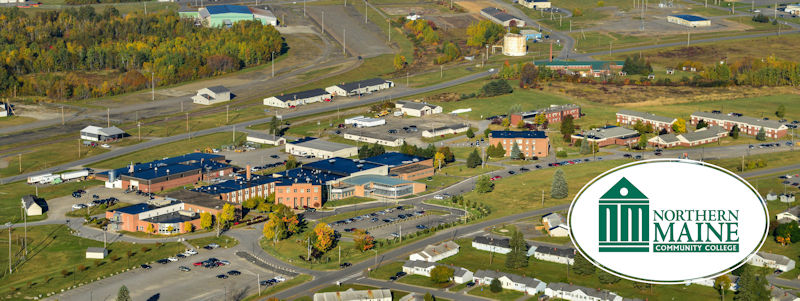
John Belyea, a licensed professional engineer, joined Northern Maine Community College (NMCC; Presque Isle) faculty to instruct the school’s new water treatment technology program. Photo courtesy of NMCC.
As college students begin their first year at Northern Maine Community College (NMCC; Presque Isle), some will add a few courses in water and wastewater treatment to their busy schedules. Come this fall, students in Maine will have a chance to learn about state-of-the-art treatment methods in a college setting. The unique program will offer an associate’s degree in water treatment technology as well as certificates in both water and wastewater treatment technologies.
John H. Belyea, the water treatment technology instructor brought on board at NMCC to help develop the program, said the curriculum and syllabi already have been approved for the courses. The college also is developing a laboratory on campus where instructors can train the students, he said.
Making degrees, certification, and continued training available
The program was created in response to a request by the Maine Department of Environmental Protection (DEP) and the Maine Department of Health and Human Services. An NMCC patron donated initial funding of $1.5 million for the program, according to an NMCC news release. The NMCC Foundation, dedicated to securing and managing funds for college programs, committed to providing an additional $300,000; and the Maine DEP provided support services valued at $50,000 to help start the program.
The 2-year associate’s degree program will cover “state-of-the-art technologies in both water and wastewater treatment,” according to the news release. And 1-year certificate programs will prepare students for “state-approved operator testing for immediate employment in the industry,” the release says.

Students will have the opportunity to earn an associate’s degree in water treatment technology and certificates in both water- and wastewater-treatment technologies at NMCC. Photo courtesy of NMCC.
In addition to these programs, the college also is developing 1-hour training modules for certified operators who want to continue their education, Belyea said. These modules will be available online and give technicians and operators the chance to advance their licensure levels, the release says.
The NMCC water treatment technology program will instruct students “in procedures for effective preparation, analysis, and interpretation of water samples, and the treatment of water for disease control,” the release says.
Catering to newbies and those re-entering the workforce
Belyea said he hopes the program appeals to both traditional and non-traditional students. This applies “especially to veterans seeking job training” or students who are returning to the water sector, he said.
Students who already have had jobs in water and wastewater treatment or “who have previous college experience, may be eligible for an assessment of prior learning, which could be applied to their new degree,” the release says.
Belyea himself is a non-traditional teacher. Instead of coming from academia, he comes directly from the water and wastewater treatment field. He’s a licensed professional engineer certified in Florida, New York, and Maine with more than 20 years of experience in engineering consulting. He has held positions at such companies as CH2M Hill (Englewood, Colo.), Arcadis (Amsterdam, Netherlands), Parsons (Pasadena, Calif.), and several nonprofits.
After many years in the field, Belyea began looking for an opportunity to teach. He did not become a teacher immediately after finishing college because “there were loans, bills, and monetary obligations,” he said. “Coming out of college, consulting was the leading way to get into the field.”
Now that Belyea is “older and more financially comfortable,” he can follow his passion, he said. He enjoys teaching, working with students, and creating lesson plans, all things the NMCC program will allow him to do, all the while addressing a water-sector need.
“The truth is that many in our field are aging out,” Belyea said. This program will help infuse the water sector with some badly needed “new blood.”
Other faculty members agreed.
“These courses are a great resource for the industry and vital to maintaining the existing workforce,” said Dottie Martin, NMCC academic dean.
Find other articles about water sector classes with the keyword TrainingCourses.
— LaShell Stratton-Childers, WEF Highlights








February 27, 2018
Featured